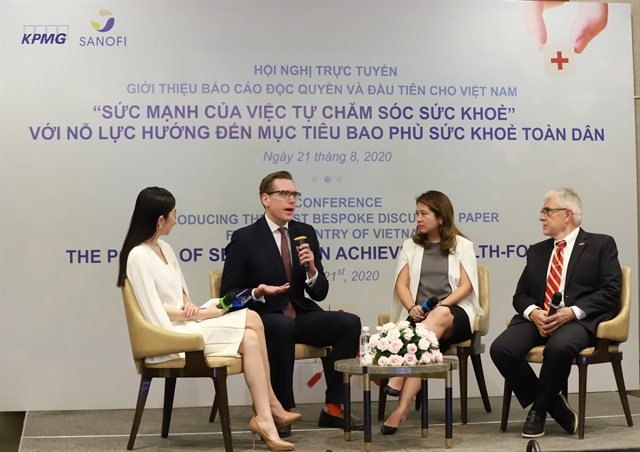 Society
Society


|
| A panel discussion on self-care at an online healthcare conference held on August 21 by KPMG Vietnam and Sanofi Vietnam. VNS Photo |
HCM CITY — Not only does self-care free up capacity for Việt Nam’s healthcare system to more effectively control expenditures, it also encourages the right behaviours by allowing individuals to have a level of responsibility for health outcomes, a veteran foreign doctor has said.
Dr Mason L. Cobb, president of the Victoria Healthcare International Clinic in HCM City, said in an in-depth self-care report titled The Power of Self-Care in Achieving Health-for-All and presented at an e-conference last week: “Việt Nam, like many countries, is challenged to fund and expand the healthcare eco-system needed to meet rising demand.
“By leveraging self-care, the Government will be able to empower people to take control of healthcare at an individual level rather than place a strain on national resources.
“Such a tool becomes especially powerful during stress test times, as is the case with the ongoing immune system virus outbreak.”
He said self-care is not difficult and only requires regular exercise that could be done at home, proper diet and managing stress by doing meditation and yoga.
“Healthcare as an economic lever, not a cost centre, and can be a game changer for policymakers to accelerate progress since a healthy population is a productive population with direct correlations to maturation factors such as tax contribution and human capital development.”
Việt Nam had a relatively developed health system in Southeast Asia with nearly 90 per cent of the population (84 million people) being covered by health insurance, delegates told the conference.
With its remarkable accomplishments in the fight against COVID-19, the country had demonstrated its outstanding medical capacity and been striving to achieve Universal Health Coverage by 2030, as a part of the United Nations’ Sustainable Development Goals.
But its healthcare system faced many emerging challenges like ageing population, healthcare expenses pushing families into poverty and the significant rise of non-communicable diseases as a consequence of improper lifestyles.
Self-care had proved effective in many countries, with proactive disease prevention and self-management of minor acute issues bringing benefits to patients, governments and industry alike.
“Self-Care can lead to a wide range of contributions towards health quality, cost reduction, labour productivity, pharmacy ramp-up, microbusiness, and even taxation,” the report said.
“In Việt Nam, the concept of self- care already exists, and we recognise the government-sponsored initiatives that can be built around it.
“In 2019 Vietnam launched ‘Sức khỏe Việt Nam’, a national campaign to promote healthy living. The aim of the programme is strongly aligned with those we advocate for here around self-care.
“To be successful, the programme requires collaboration across government departments and with experienced private sector constituents.”
Besides, the report listed socio-economic advantages gained from self-care implementation in Việt Nam, pointing out that for instance the country’s healthcare system could save $0.37-0.61 billion annual in disease treatment while $4.2 billion in annual economic outcomes could be unlocked.
The adoption of self-care is also compatible and strongly aligned with the aims and initiatives of the Sức khỏe Việt Nam programme.
Luke Treloar, director, head of healthcare and life sciences, KPMG Vietnam, said, “The discussion paper looks into one of the biggest challenges that Việt Nam’s health system is facing on its path towards ‘Vietnam 4.0’ vision and universal health coverage goals.”
Penn Policarpio , general manager, Sanofi Consumer Healthcare, Vietnam and Cambodia, said: “Self-care is essentially the practice of allowing individuals to manage their wellness efficiently, to co-ordinate with healthcare experts when needed.” VNS




